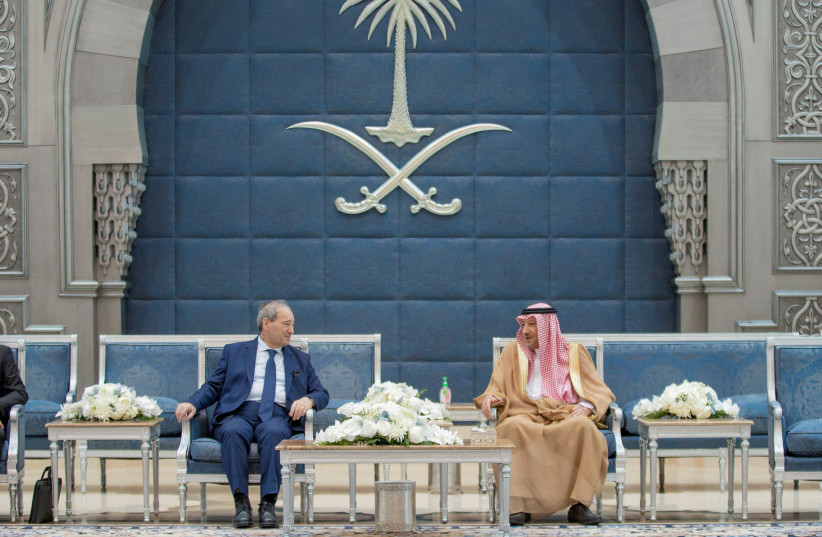The foreign ministers of the Gulf Cooperation Council including Egypt, Iraq and Jordan met in Jeddah, Saudi Arabia this weekend to discuss the importance of Syria, the ongoing civil war there and the country’s new integration into the Middle East.
This is part of a wider process of diplomatic engagement in the region. In essence the moves that Syria is making were prepared in advance by Egypt and several Gulf states with the goal of bringing Syria “back” into the Arab world after a decade of civil war.
Not everyone wants to bring Syria back
Not every country in the region is on board with Syria returning to the Arab League, but the meeting in Jeddah clearly shows progress on the issue. The report at UAE -based The National noted that “the top diplomats from GCC members Bahrain, Kuwait, Oman, Qatar, Saudi Arabia and the United Arab Emirates, along with those of Egypt, Iraq and Jordan, met in Jeddah at the invitation of Saudi Foreign Minister Prince Faisal bin Farhan.”
The meeting stressed the "importance of having an Arab leadership role in efforts to end the crisis", according to a statement released by the Saudi foreign ministry. The meeting in Jeddah comes amid a whirlwind of diplomatic outreach in the region.
To give some examples, Bahrain and Qatar have recently reconciled. Saudi Arabia and Iran have also reconciled. Oman is helping broker an end to the conflict in Yemen, which has caused immense suffering.

In 2015, as the Iran-backed Houthis were on the verge of taking Aden, Saudi Arabia intervened to back the Yemen government. Since then Iran used Yemen as a testing ground for missiles and drones, targeting Saudi Arabia and other Gulf states. An end to that war would be major news for the region and could lead also to a peace deal in Libya, where another civil war rages.
Another important reconciliation between Turkey and Egypt is also ongoing and diplomatic engagement is leading to more high level meetings and to full normalization of ties. Turkey opposed Egypt’s government since the overthrow of the Muslim Brotherhood regime in 2013.
In addition the talks between Egypt and Turkey may impact Libya. Meanwhile, United Arab Emirates president Sheikh Mohammed bin Zayed arrived in the Egyptian capital Cairo on Wednesday, the UAE state news agency said last week.
A broad view of the developments
It's important to see all these movements in concert. The UAE and Egypt had already done outreach to Syria. Saudi Arabia then followed and Riyadh also encouraged Bahrain to repair ties with Qatar. While Egypt, the UAE and Saudi appeared ready to welcome Syria back into the Arab League, there are countries like Qatar, Kuwait, Morocco and others that are more cautious. The importance of the Jeddah meeting is to bring together various countries and see where each one stands on the issue.
These developments come as China and Russia are trying to make more inroads in the region. Russia is a key ally of Syria’s regime and as well as Iran. Iran backs the Syrian regime and destabilizes Syria by sending weapons to Hezbollah via Syria. China has sought to do outreach to the Gulf. This concerns the US and the US has been trying to patch up ties with Saudi Arabia.
President Biden’s senior Middle East adviser Brett McGurk and US envoy for Global Infrastructure and Energy Security Amos Hochstein flew to Saudi Arabia and met with Crown Prince Mohammed bin Salman on Friday. CIA Director William Burns made an unannounced visit to Saudi Arabia early last week and US national security adviser Jake Sullivan spoke with Saudi Arabia's Crown Prince Mohammed bin Salman last Tuesday.
If you add it all up that’s probably more visits and calls by more US officials in a shorter period of time than at any time in recent memory. This is a full court press by the US regarding Riyadh.
Saudi Arabia is seeing its independent foreign policy and initiatives pay off. Meanwhile Russia is trying to get Turkey to reconcile with Syria. Many things are in the works in the region as a new diplomatic era dawns. It’s entirely possible that in coming weeks more momentous diplomatic activity will take place.
